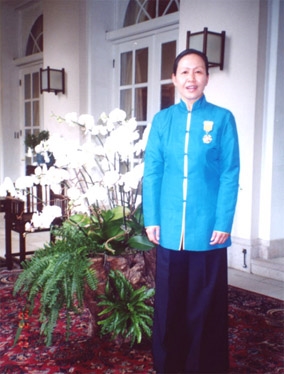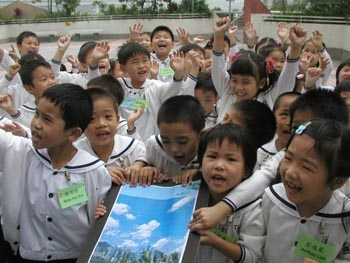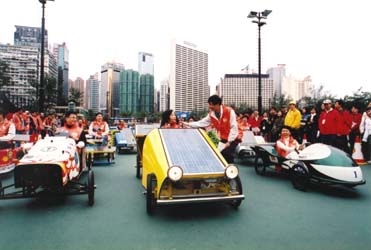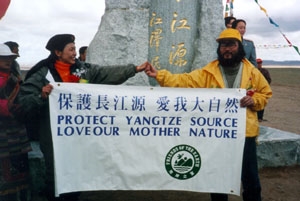 |
| Mrs. Mei Ng (Friends of the Earth, Hong Kong) |
Mrs. Mei Ng was elected to the United Nations Global 500 Roll of Honor on World Environmental Day in 2000. The following words from her acceptance speech tell a lot about who she is and why she received such a high honor. "I am committed to the Green Long March. It has been a lonely journey operating in a super materialistic society like Hong Kong. My fulfillment is in the bridging role I play between the public and the government, between the private and the public sectors, between Hong Kong and Mainland China, between this generation and the next one, between the planet and its people. Winning the UN Global 500 Award will empower me to continue the march by lighting more candles as pathfinders for more concerned individuals." She also said, "My reward lies in the number of trees saved from the axe, the number of children who can breathe easier and the attitudes and behavior I have managed to change. I am rich when natural assets increase. I am fulfilled when more people say goodbye to ignorance, apathy and greed."
Mrs. Mei Ng was born in Hong Kong; and graduated from the University of California, Berkeley in Anthropology in 1972. It was during these years in California that she was first exposed to the beginnings of the environmental movement. California provided a perfect learning environment for the future Director of Friends of the Earth, Hong Kong (FOE-HK). In 1970, the President of the United States, Richard Nixon, spoke of sweeping environmental reforms in his state of the union address. That same year saw the creation of the Environmental Protection Agency or EPA that is still in existence today. 20 million people took to the streets in America, that April 22nd, to protest the poisoning of its air, water and food supply. Words like recycle, don't pollute and save the planet started to make their way into the mainstream. And a movement was born. But it has taken longer for this movement to reach other places like China and Hong Kong.
 |
Hong Kong, a port city of 7 million people, is so thick with air pollution 65 days of the year that you cannot see the mountains of China across the harbor. It is paying now for the practice of relocating many of its high-polluting industries across the Pearl River Delta and into low wage factories in China. The toxic soup they emit blows back across the water and Hong Kong's air pollution has reached a critical point and needs to play catch up. Mrs. Ng believes the government of Hong Kong and its policymakers have a lot to do to catch up to the environmental standards of other world cities. They are just in time to jump on board the flurry of clean-up and sustainability ideas that are being put into practice in the many countries that ratified the Kyoto Protocol (see extra info) last month. One solution would be to develop renewable energy as a way to reduce emissions from cars, trucks and factories. To showcase this idea, FOE (HK) holds an annual SOLAR CART RACE. 80 teams were judged on things like design and efficiency. Everyone had a great time and the media attention educated the public about the dangers of too many fossil fuel burning cars.
 |
| Solar Cart Race in Hong Kong (foe.org.hk) |
Mrs. Ng, appointed in 1993, is the first Chinese Director of Friends of the Earth (Hong Kong). She is an outspoken ally of the earth and is inspiring many new leaders to join her on her quest to reverse decades of unchecked environmental plunder. The goal of her organization is to raise public awareness, monitor the environmental protection programs and promote sustainable development in Hong Kong and over into China. One way they hope to achieve this is to open EARTH STATION - a center for sustainable development and education.
Mrs. Ng believes education plays a powerful role in raising the public's awareness of their own environment. She believes that environmental awareness should start from early childhood and, therefore, FOE (HK) spreads its green footprint through school workshops, seminars, activism in the streets, community projects and training. Their fund helps schools and ngo's put their environmental ideas into practice. See - EDUCATION - at their website, www.foe.org.hk, to view their many projects and campaigns, and ways for teachers and their students to get involved. One such program is the "Packaging EPS Recycling Program" launched in September, 2004 with support from the Environment and Conservation Fund. Everyday, around 100 tons of EPS waste is disposed of in local landfills. This waste can be recycled into new plastic products and raw materials. FOE (HK) is offering free school talks to increase awareness and understanding of this environmental process.
 |
| Child Planting a Tree (foe.org.hk) |
FRIENDS OF THE EARTH (HK) PLANT TREES
We plant for green belts
We plant for human needs
We plant for fresh air*
We plant to reduce global warming**
We plant for soil erosion control
We plant for rehabilitation after hillfire
We plant for biodiversity
We plant for community education
We plant for YOU AND OUR NEXT GENERATION!
(*Each hectare of woodland can provide oxygen for 30 people for one year.)
(**Each big tree can absorb 15kg of CO2 each year.)
FRIENDS OF THE EARTH (HK) and Mrs. Ng believe in "do it yourself" environmentalism. In grassroots mobilization. A case in point: "Women in China hold the key to sustainable development. Empowering them to manage changes in economic and social reforms and resource efficiency will prevent waste, exploitation, and further damage to China's ecosystem. Investing in women is the best investment in the New Millennium. Imagine the impact each of the 600 million women will have on their other halves, food production, consumption and quality of life for the next generation! As Earth Mothers, China women could make a 'world of difference'."
 |
| On The Protest Trail (foe.org.hk) |
The following are some thoughts from Mrs. Ng in her open letter for Earth Day on www.foe.org.hk.
"It is time for demanding responsibility. Globalization, consumption, growth and quality of life need to be re-defined in the context of producer and consumer responsibilities, more importantly, as inter-generational responsibility."
"If the revolution is to begin, it has to begin with our kitchen table; it has to begin with what's in our body and what's in our head. For every kilogram of pesticide we count the bushels of grain but not the cases of cancer; we see burgers without the obesity, the cows but not the growth hormones, imported produce but not the unfair subsidies, advertisements to consume but not the debts, shares we buy but not the exploitation. Are we ready to decode the traps, the brands, the addiction and the hypocrisy?"
"In fact it does not need a big revolution to redeem our planet and ourselves. All it takes are small steps to cool the climate and our mutually induced mass destruction. Simply by switching two standard light bulbs to more efficient fluorescent bulbs, replacing the current shower head with a low flow model, turning the thermostat down two degrees for one year and cutting vehicle fuel by 10 gallons a year will help to eliminate ONE TON of carbon dioxide emissions."
"A good life, decent living, happy children, bright future, peace and security are not guaranteed if the planet we inhabit is fighting back excessive greed, selfishness and apathy with extreme weather, rising temperatures and epidemics. Can we turn a blind eye to problems in paradise?"
"One Note, one Vote, one Share, one Care. Everyone can make a world of difference with the dollar note we spend, the vote we cast, the share we buy and a dose of care for the planetary health that we all depend upon for our common existence and that of our future generations."
China has a population of 1.3 billion people. The steps they take have a large impact on not only themselves, but on the global community. They, like the rest of the world, have many environmental problems but also have the solutions within their grasp. With the help of Mrs. Mei Ng and organizations like Friends of the Earth, Hong Kong it is easier to see and chart the course that needs to be taken to move the planet and her people back to a healthier and more sustainable future.
Take part in your environment. Check out the links below for more information and to get involved in helping your planet.
Page created on 3/15/2007 6:12:21 AM
Last edited 1/5/2017 9:46:23 PM
The Kyoto Protocol, an international agreement adopted in December 1997 in Japan, went into effect on February 16, 2005. The Protocol sets binding targets for developed countries to reduce greenhouse gas emissions on average 5.2 percent below 1990 levels, in order to address global warming.
Essential Background of the Kyoto Protocol
(from the United Nations website, www.unfccc.int)
Feeling the Heat
The average temperature of the earth's surface has risen by 0.6 degrees C since the late 1800s. It is expected to increase by another 1.4 to 5.8 degrees C by the year 2100 -- a rapid and profound change. Even if the minimum predicted increase takes place, it will be larger than any century-long trend in the last 10,000 years.
The principal reason for the mounting thermometer is a century and a half of industrialization: the burning of ever-greater quantities of oil, gasoline, and coal, the cutting of forests, and certain farming methods.
These activities have increased the amount of "greenhouse gases" in the atmosphere, especially carbon dioxide, methane and nitrous oxide. Such gases occur naturally and are critical for life on earth; they keep some of the sun's warmth from reflecting back into space, and without them the world would be a cold and barren place. But in augmented and increasing quantities, these gases are pushing the global temperature to artificially high levels and altering the climate. The 1990s appear to have been the warmest decade of the last Millennium, and 1998 the warmest year.
Climate change can be difficult -- you could ask the dinosaurs, if they weren't extinct. The prevailing theory is that they didn't survive when a giant meteorite struck the earth 65 million years ago, spewing so much dust into the air that sunlight was greatly reduced, temperatures plummeted, many plants didn't grow, and the food chain collapsed.
What happened to the dinosaurs is a rare example of climate change more rapid than humans are now inflicting on themselves. . . but not the only one. Research on ice cores and lake sediments shows that the climate system has suffered other abrupt fluctuations in the distant past -- the climate appears to have "tipping points" that can send it into sharp lurches and rebounds. Although scientists are still analysing what happened during those earlier events, it's clear that an overstressed world with 6.3 billion people is a risky place to be carrying out uncontrolled experiments with the climate.
The current warming trend is expected to cause extinctions. Numerous plant and animal species, already weakened by pollution and loss of habitat, are not expected to survive the next 100 years. Human beings, while not threatened in this way, are likely to face mounting difficulties. Recent severe storms, floods and droughts, for example, appear to show that computer models predicting more frequent "extreme weather events" are on target.
The sea level rose on average by 10 to 20 cm during the 20th century, and an additional increase of 9 to 88 cm is expected by the year 2100. (Higher temperatures cause ocean volume to expand, and melting glaciers and ice caps add more water.) If the higher end of that scale is reached, the sea could overflow the heavily populated coastlines of such countries as Bangladesh, cause the disappearance of some nations entirely (such as the island state of the Maldives), foul freshwater supplies for billions of people, and spur mass migrations.
Agricultural yields are expected to drop in most tropical and sub-tropical regions -- and in temperate regions, too, if the temperature increase is more than a few degrees C. Drying of continental interiors, such as central Asia, the African Sahel, and the Great Plains of the United States, is also forecast. These changes could cause, at a minimum, disruptions in land use and food supply. And the range of diseases such as malaria may expand.
Global warming is a "modern" problem -- complicated, involving the entire world, tangled up with difficult issues such as poverty, economic development, and population growth. Dealing with it will not be easy. Ignoring it will be worse.
Over a decade ago, most countries joined an international treaty -- the United Nations Framework Convention on Climate Change -- to begin to consider what can be done to reduce global warming and to cope with whatever temperature increases are inevitable. In 1997 governments agreed to an addition to the treaty, called the Kyoto Protocol, which has more powerful (and legally binding) measures. The Protocol is expected to take effect soon. And, since 1988, an Intergovernmental Panel on Climate Change has reviewed scientific research and provided governments with summaries and advice on climate problems.
NOTE: The Kyoto Protocol was ratified February 16th, 2005
